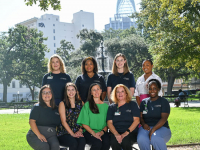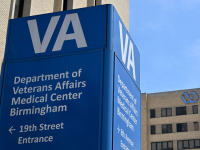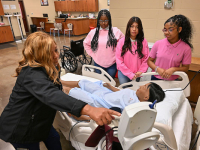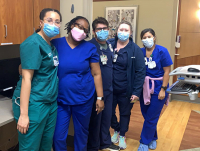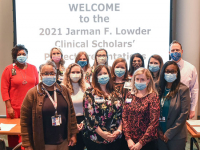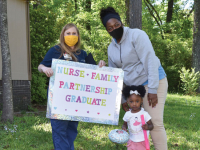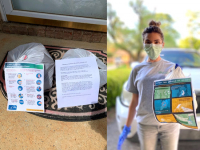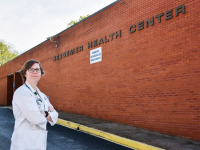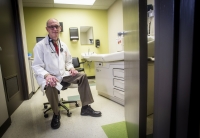
By Laura Gasque
Transforming the care of Veterans and their families by working collaboratively to educate compassionate, highly competent nurse leaders is the goal of an ongoing partnership between the UAB School of Nursing, the U.S. Department of Veterans Affairs and the Birmingham VA Health Care System.
In the fall of 2024, the School launched its third nurse residency with the BVAHCS, a Primary Care Nurse Practitioner Residency, joining its successful and CCNE-accredited Mental Health Nurse Practitioner and Post-Baccalaureate-Registered Nurse Residencies.
One of three original VA Nursing Academy sites in the U.S.—now known as the VA Nursing Academic Partnership—the School has had a formal relationship with the BVAHCS since 2009.
In 2015, the School and BVAHCS received the American Association of Colleges of Nursing Exemplary Academic-Practice Partnership Award, which recognizes AACN member institutions involved in highly productive and model academic-practice partnerships.
Partners in primary care
“The BVAHCS/UAB partnership in the Primary Care Nurse Practitioner Residency underscores the commitment of all stakeholders to serve our Veterans with the best and brightest of our profession, trained to serve with confidence and competence,” said Assistant Professor and PC-NPR Affiliate Director Alice Bristow, DNP, CRNP, FNP-BC, CNE, BC-ADM (BSN 2006, MSN 2012, DNP 2019).
The Primary Care Nurse Practitioner Residency launched in September 2024 with three residents in this post-Master of Science in Nursing or post-Doctor of Nursing Practice traineeship. Residents are new primary care Family Nurse Practitioner graduates who will receive Veteran-centric training through clinical experiences and didactic classroom instruction in an interprofessional environment. Bristow said the role of the nurse practitioner is vital, especially to Veteran communities.
“With 88% of NPs currently educated in primary care, we provide excellent quality primary services at cost savings, and our work in vulnerable populations increases access to health care for millions of people,” Bristow said.
“Collaboration between academic institutions, such as UAB and VHA, is the cornerstone of progress in health care, bridging theory with practice to advance medicine and improve patient outcomes,” said Jana Falkner, DNP, RN, NE-BC, Deputy Director of Primary Care for the BVAHCS. “The Primary Care Nurse Practitioner Residency will enhance the competencies of new primary care nurse practitioners and prepare highly qualified leaders to transform the care of Veterans and their families.”
“The Primary Care Nurse Practitioner Residency will facilitate a smooth transition of newly graduated primary care nurse practitioners into practice,” said Professor and Associate Dean for Clinical and Global Partnerships Michele Talley, PhD, CRNP, ACNP-BC, FAANP, FAAN, FNAP (MSN 2005, PhD 2015). “And, our continued partnership with the BVAHCS serves as yet another nursing workforce accelerator.”
Meeting mental health needs
The Mental Health Nurse Practitioner Residency was the School’s first with the BVAHCS. It began in 2014 and in 2023, received accreditation from the Commission on Collegiate Nursing Education. Its goal is to train more nurse practitioners to address the mental health needs of a growing Veteran population.
“Our partnership has received several accolades over the years and achieving accreditation is, so far, the pinnacle of its success and a testament to the dedication of the faculty, staff and residents involved,” Talley said.
Assistant Professor, MH-NPR Affiliate Director and Co-Coordinator of the School’s PMHNP Specialty Track Brenda Mayfield, DNP, CRNP, PMHNP-BC (MSN 2018, DNP 2022), said the accreditation elevates the program on a national level and makes it even more competitive. This one-year residency accepts applicants from across the country for the three available resident slots. Like the others, residents are newly graduated licensed PMHNP professionals who receive training through clinical experiences and didactic classroom instruction in an interprofessional environment.
“I think there’s a growing recognition of the value of residencies,” Mayfield said. “Residencies provide many opportunities, including a safety net for practice, increasing levels of responsibility over time, and an opportunity for mentors to benefit from the didactic content presented for the mentees learning.”
The MHNP residency provides the opportunity to experience every facet of Veteran-centric mental health care within the BVAHCS.
“Our residency draws its strength from the close partnership we have with the VA and prepares mental health nurse practitioners to care for the complex needs of our Veterans,” Mayfield said. “Additionally, the partnership provides an opportunity to expand access to mental health care through the resident continuity clinic staffed by BVAHCS personnel and our MHNP residents.”
Mayfield added that the residents also have presented their work on a national level at the American Psychiatric Nurses Association Conference every year since the program started. As proof of the quality of the program, the MHNP residency is now run by graduates of the program, including Mayfield.
“It has literally come full circle,” Mayfield said. “I’m grateful to get to be a part of it. I’m so proud of all the residents. They have always exceeded the bar, and it’s impressive what they have accomplished.”
Early training ground
The Post-Baccalaureate-Registered Nurse Residency began in 2017. It is a one year, cohort-based training program for newly licensed RNs prior to them becoming a staff nurse. The curriculum model is designed to provide new graduate nurses an opportunity to apply the knowledge and skills gained during prelicensure educational experiences across various clinical settings, implementing both didactic and experiential learning activities.
“The School and the BVAHCS are positioned to prepare the next generation of nurses to care for America’s Veterans,” said Assistant Professor Randy Moore, DNP, RN, CCRN (BSN 1993, MSN 2004, DNP 2012). “Nurse residencies are revealing themselves to improve retention rates, increase clinical competency and acclimate these new RNs to the health care system where they are employed.”
Working with an interprofessional care team, the residents spend time training in a primary care setting, a medical-surgical setting, a specialty care setting such as an intensive care unit or emergency department and in a leadership setting with nurse managers, clinical nurse leaders and others. The goal is to help the residents develop effective decision-making and clinical leadership skills, as well as strategies to incorporate research and evidence into practice.
As a Veteran himself, Moore is passionate about teaching students about the health challenges that Veterans might face.
“Veterans can have unique health issues, and while some of their issues are the same as any other patient, unfortunately there are conditions that occur with increased frequency among this population. Understanding some of those health issues and understanding the Veteran culture help break down barriers to treatments and therapies,” Moore said. “While our goal is for these residents to remain in a VA health care system, we also understand that of the approximately 22 million Veterans in our nation, only about eight million of those receive any portion of their health care inside a VA system. Asking the question, ‘Have you or any member of your family ever served in the military?’ can sometimes open the door to both issues and possible resources.”

